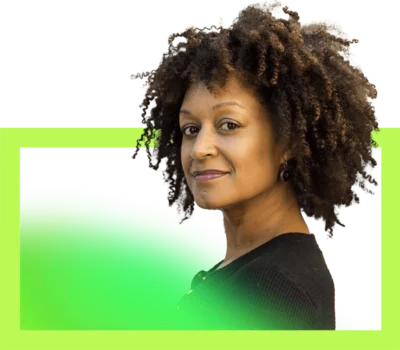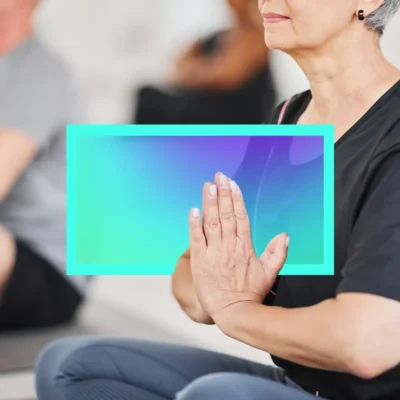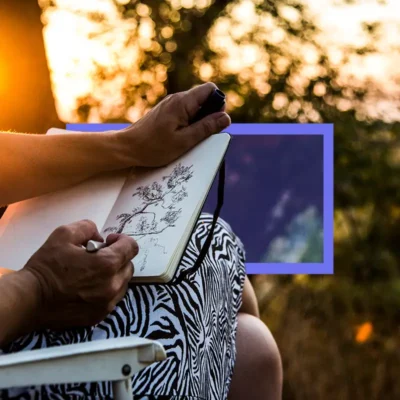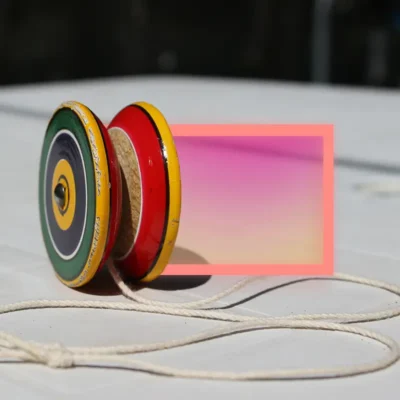Learning to share our honest, imperfect stories
Journalist and beloved podcast host Leila Day grows up being told that she should “tone it down.” When she moves to Cuba in her early twenties, she finally finds a place that embraces her whole identity — or so she thinks at first. It’s only after making one simple change that Leila sees how quickly others treat her differently, and she realizes she has something to say about it. By expressing her authentic voice, she finds her authentic power.
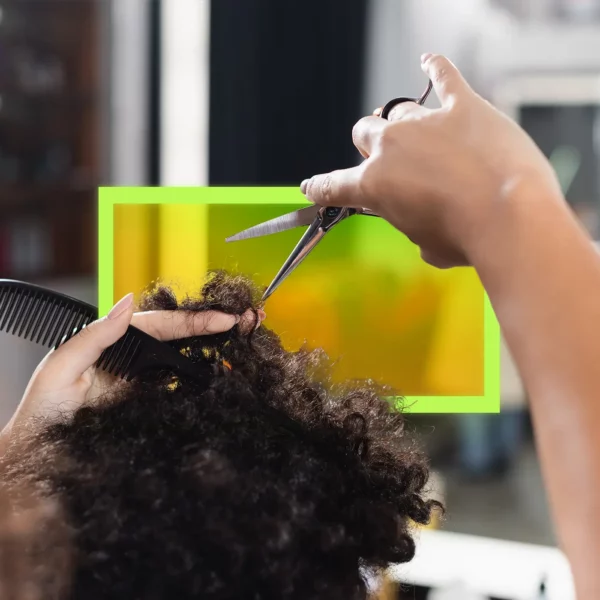
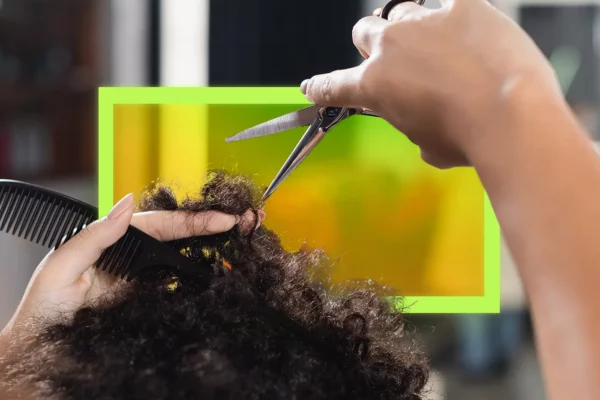
Table of Contents:
Transcript:
Learning to share our honest, imperfect stories
LEILA DAY: Havana is just as magical as I remembered. At night, crowds linger along the Malecón, an ocean wall that protects the city from storms. As the waves crash against it, lovers, philosophers, poets, musicians, fishermen and students discuss politics and philosophy and they debate about capitalism and socialism. I also see how people struggle here. Really struggle. But I feel a confidence in people too, and I sometimes just sit and observe their laughter, how they use their voice, their hands. I try to soak it all up.
ROHAN GUNATILLAKE: Leila Day is an award winning journalist and co-host of the beloved podcast, The Stoop. In today’s story Leila takes us to a pivotal time in her life when living abroad in Cuba. There, she discovers that having the courage to examine our own imperfect stories can connect us deeply. And how in finding our authentic voice, we find our authentic power.
In this series, we combine immersive first-person stories, breathtaking music, and mindfulness prompts, so that we may see our lives reflected back to us in other people’s stories. And that can lead to improvements in our own inner lives.
From WaitWhat, this is Meditative Story. I’m Rohan, and I’ll be your guide.
The body relaxed. The body breathing. Your senses open, your mind open, meeting the world.
DAY: A beam of sunlight shines down through the panes of the glass ceiling. It’s like a spotlight on me, where I sit at my desk in an almost empty room. Gorgeous plants surround the office lobby. Every angle in this room is perfectly stylized and meticulously curated. This place looks like the gateway to hipsterdom. I’m the gatekeeper.
And I hate it.
I’ve been working as a receptionist at this architectural firm in San Francisco for a few months now. I’m in my early twenties. On occasion I answer the phone or I take down a message, but mostly, I do nothing. I’m part of the aesthetic. I suspect I’m here because my bosses wanted a Black girl in the front office.
A man wearing a fleece vest over a button down shirt walks in. I look up at him and I smile, like I’m supposed to. “How can I help you today?”
No one cares if I’m actually good at this job. One of my main responsibilities is making coffee, and I don’t even know how to use the coffee maker. I just sit here and look a certain way. The token Black girl. I’m deeply uncomfortable in this role. I barely speak to anyone in the office. But I remind myself that I’m young, and it’s good money for my first job out of college.
When I think about it, my appearance has always been something that people openly judge. Not necessarily my body, but my Blackness.
I think back to growing up in Las Vegas, when I’m 11, studying ballet. I stand tall in a black leotard and pink tights. The studio space is brightly lit, almost sterile. My teacher tells my whole class to lie down with our backs flat against the gritty, studio floor. She shouts out, “There shouldn’t be a gap between your back and the floor.” I try so hard to press my lower back as close to the hardwood as I can. But my body — it curves. I have hips and a booty. I look to my left and I see that the white girl next to me..she looks at ease. I can feel my ballet teacher’s eyes on me as I struggle.
Then, I hear a voice call out, “Our bodies don’t do that.” It’s the other Black girl in the class. She’s upset and she speaks up. And she’s right. Our bodies don’t do what our teacher is asking. I think, wow. I wish I could snap back like that. I wish I had that confidence. I wish I could be her.
But I’m not. Instead, I start to believe ballet just isn’t possible for me.
As a young Black woman, I hear people tell me: “Why are you sticking your butt out like that when you walk? (I’m not). Be humble. Cover up. You’re acting too fast.” I hear these messages from family, from my community, at school. There’s so much attention on my body, I’m constantly toning things down so I don’t stand out. The curves, the sway in my back, the way I move, these are things that I don’t grow up feeling proud about. I develop a real self-consciousness. I retreat into myself.
Back at my desk, my boss comes out to greet the man in the vest. They disappear back into the well-manicured office and I’m left alone.
I feel lonely in San Francisco. I feel lonely in America. Everyone around me is trying to tell me who I am, and I don’t have the space to figure it out for myself.
The last time I truly felt alive was in Cuba. I lived there for three weeks in college, studying Spanish. I fell in love with the people, the culture. The values feel different. It’s more organic. More free.
In Havana people are so outgoing. Strangers engage with each other on the street. In San Francisco, life feels so insular.
Sitting at my desk, as the hours roll by, I run the math repeatedly in my head. If I just work this job for 8 months, if I save up everything I can, then maybe I can go back to Cuba. Maybe that’s where I need to be to feel more like me, to really figure out who I am.
“Okay, uno, dos, tres,” Zanety counts the beats. There’s no music. He just sounds it out, “Ah oh, uh uh uh ah ah.” I wear my black biker shorts and tank top. Zanety’s in blue jeans. We’re both in our socks dancing.
We’re in a basement studio in Havana. I’ve moved back. The first thing I do is take Afro-Cuban dance lessons. The floor here is a little sticky and the space smells like stale booze. In the evenings, it’s a jazz and salsa club. The energy from last night’s party still lingers in the air.
Today, Zanety shows me movements connected to the Orishas, the Yoruba spirits that represent the guardians of human destiny. He tells me to channel Yemayá, the goddess of the sea. We move together, rolling like the waves, spinning and bending. I kick my leg high up in the air and I arch my back. We’ve combined Afro-Cuban, modern, ballet, everything into this moment on this sticky dance floor.
Zanety, I must say, is very good-looking, beautiful even. Really dark skin, bald, beautiful white smile, a dancer’s body — totally chiseled. You’d think that after a few weeks here I would have fallen madly in love with him, but I don’t. I’m just in love with the way he teaches me to dance.
Zanety’s always trying to pull me out. “I know you’re in there,” he says. “I know you have something to say. Feel it, Leila. No tengas miedo: Don’t be afraid.” His words remind me to stop toning it down. I can’t do this dance half-assed. Even with the most subtle moves, there has to be a confidence in it.
I feel my heart open through Afro-Cuban modern dance. The steps accentuate everything about my body — my hips, my curves. I connect so deeply with the African roots and the modern moves. I feel so beautifully Black, and proud and so alive. I feel that a lot since moving back to Cuba.
Havana is just as magical as I remembered. At night, crowds linger along the Malecón, an ocean wall that protects the city from storms. As the waves crash against it, lovers, philosophers, poets, musicians, fishermen and students discuss politics and philosophy and they debate about capitalism and socialism. I also see how people struggle here. Really struggle. But I feel a confidence in people too, and I sometimes just sit and observe their laughter, how they use their voice, their hands. I try to soak it all up.
GUNATILLAKE: The Malecón in Havana, the basement dance studio, these are places of self-expression for Leila. Where in your life can you go to be with others and be more of who you are, whether that’s through conversation or through movement? And if you’re not sure, how about being open to discovering such a place, where you find space to examine your own beliefs.
DAY: On a summer afternoon, I sit in my chair in my apartment with a towel draped around my shoulders. I look out through the big wooden doors onto my terrace. Children laugh and play on the street below. My friend Rodrigo stands over me, holding a pair of scissors. “You ready?” he asks. “I am,” I say. He reaches down to the back of my head and starts to cut. I hear the scissors slice through my hair. Sections of hair float to the tiled floor. I stare blankly. Rodrigo tells me, “It’s looking beautiful. Let’s do this mulatta.” Rodrigo always calls me mulatta. Most Cubans call me that.
The relationship with race is so different in Cuba. There are interracial couples everywhere, and no one cares. Everywhere I go in Havana, I’m called mulatta, meaning I’m mixed race, some combination of Black and Spanish. I have brown skin and I straighten my hair with relaxers. “Oye mulatta ven aca!” my friends would say. Or if I’m being singled out in a room, “Pregunta la mulatta”: ask the mulatta. Back home, having your race called out repeatedly might be uncomfortable, but here it feels common, direct and without baggage.
I haven’t been here long, but it seems like the racism and judgment that I felt back home in America hasn’t followed me here. Getting in touch with my body and my roots through dance, I’m slowly feeling more comfortable in my skin.
I usually straighten my hair with relaxers, but they’re imported goods and difficult to come by. So eventually, I decide screw it. I don’t need to straighten my hair anymore. It’s something I’ve done my entire life. Since I was six years old, whenever my kinky roots would grow out, my Mom would take me to the salon. They would slap on the chemicals and I’d silently cry because it burned. I’ve never known my hair any other way. But now, it’s breaking off. It looks a mess, and I’m not feeling cute.
As Rodrigo snips away, our friend Juan Sol comes into the room to watch. He cheers me on. He’s Chilean, like Rodrigo. They see this as an act of resistance, which it isn’t. Juan holds up a fist, “Si, Si, Si.” Finally, Rodrigo steps back. “Ya finito,” he says proudly.
I go into the bathroom and I look in the mirror. He’s done his job. My straight hair is gone and a thick wooly poof rests on top of my head. I touch it like it’s a sea urchin and feel how it bounces back. I pull at the coils. I try and fail to run my fingers through it. This is my afro.
I grab my purse to look for some lipstick. I swipe the red color on my lips. I find some big earrings. This new look … it feels liberating and sexy. I feel great. Juan and Rodrigo approve. This is a win.
I’m grateful to finally be in a place where I can embrace my hair, my body, my style, my culture. Where I can feel empowered to discover who I am, on my own terms and embrace new experiences, without being limited by the racial lenses and judgements of others. The things I would hide in America, I flaunt here. Look at me.
At least that’s how I feel at first.
“Why did you cut your hair? You look negra now.” This question catches me off guard. A group of us are standing together outside on a warm Havana evening. My friend’s husband is the one who asked. He’s from Havana, he’s considered a white Cuban. He’s looking at my hair with a snarled lip. He hates it.
His question hangs in the air. “Why did you do that? You look negra now.”
He means that without my long, straight hair, I don’t look mulatta anymore. “Negra” is the word people use in Cuba to refer to someone who is Black. I never thought it had any negative connotation here. But maybe that’s because I’ve been called ‘mulatta’ until now. But the way my friend’s husband is asking this, it sounds like looking negra is a bad thing. As if there’s a hierarchy, with blanco at the top, and then mulatta or mestizo, and negra at the bottom.
I feel embarrassed. And suddenly less attractive. The comment feels racist, but I second guess myself. This man is married to a Black woman. I can see that he doesn’t think anything of what he said, neither does his wife. No one else in the group seems to either. These comments are normal in Cuba. I just hear them differently.
In the months after my new haircut, “negra”— not mulatta — is what people call me when I go out on the street. It’s always said with a certain tone.
I never thought how much one small thing can change people’s entire perception of you. With my new hair — my natural hair — I have what’s called here in Cuba — pelo malo. ”Bad hair.”
This doesn’t feel right. I thought I found a place where I feel safe. And Cuba does celebrate Blackness in many ways, and takes pride in its mixed culture. I still love it here.
But I realize now, I’ve been ignoring certain problems — some of the same problems that exist back in the US. At first, I just want to shut down and retreat into myself again and become that person nobody realizes is in the room. But Cuba has helped me find my voice. So instead of covering up, I start to ask questions.
I start to examine how I feel about this subtle prejudice. I ask my friends, “What do you mean when you say I’m ‘acting like a negra’?” “Why would you say it like that?” I also reflect inwards. I choose to interrogate my own flaws. Why did I feel better when I was called mulatta? How much of that invisible hierarchy have I internalized? How much have I benefited from it?
Cuba isn’t perfect. But I’m not perfect either.
One evening, I invite a group of my friends — women of all shades — over to my apartment to help me examine my beliefs. They sit on my green velvet couch and we drink Havana Club rum and cokes from little glasses with flowers on them. I listen to their stories. I hear their perspective. They tell me, yes, they too have felt shame sometimes when people call them “negra.” They tell me stories of their childhood, things that happen at university. They talk about interracial relationships and the emotional toll that was inflicted. They are open, and they’re honest, and they snap their fingers, and interrupt each other. Everyone has a story.
At the end of these heated conversations, we turn on the music and dance. We dance in the living room to salsa, taking it down to the ground then back up again. We do all these moves that make us feel free and happy and sexy and alive.
I decide to write about all of this, my whole hair saga, in an article for the national newspaper. I’ve been doing occasional stories since I moved here, mostly about my experience as an American living in Cuba. I call this new article “Pelo Malo.” Bad hair.
When my piece is published, I receive heaps of letters in response. They come from all over the country, even from really small towns. People share their experiences with me, and they tell me how they relate to what I wrote. It really fills me up. Writing about my experience, admitting I ignored this undercurrent, it feels vulnerable, but it also feels true. I have that same sense I have in the dance studio. Like, my true self is being pulled out. It feels powerful.
GUNATILLAKE: Leila grows in her truth here, through exploring her experiences and expressing them in words. In an echo to what Leila is doing, bring to mind an experience that you haven’t had the space to fully process yet. Now soften. Be with it. Don’t judge it, or yourself. See if you can find a moment to reflect or journal about this experience this week. It’s about being honest, not perfect.
DAY: The backs of my arms brush against the soft red velvet of the auditorium seat. The theater is abuzz with attendees from Havana’s international women’s conference. From where my friends and I sit in the theater’s upper tier, I look down to the lower level. Every seat in here is filled.
A hush falls over the audience. The next speaker is about to take the stage. There’s a moment of quiet and then … a deafening applause breaks out as Fidel Castro, Cuban revolutionary and president, walks up to the podium. We don’t always know when he’ll show up at events like this, but he’s here now.
When the applause dies down, he starts to speak about unity, and what keeps Cuba strong and undivided as a country. He says he recently read an article that discussed perceptions around good hair and bad hair — the things that divide us. My friend elbows me and gives a little squeal. The article he’s referencing is mine. Pelo Malo. My jaw drops. Oh my god. Oh my god. Fidel Castro is talking about my story. My friends are going crazy. They start high-fiving me and grabbing my shoulders.
One of my first thoughts is, I won’t be able to really tell this story to my friends back in the States. Fidel Castro is seen so differently there. But here in Cuba, my friends, they suddenly think I’m a celebrity.
Onstage, Fidel Castro continues, saying that it doesn’t matter what type of hair you have, it doesn’t matter the color of your skin. We should all come together as Cubans. The audience hangs on his every word.
Sitting back in my auditorium seat, I feel a swell of emotion. I feel so proud. This article is authentically me. It’s my voice. And it’s connecting with people across the spectrum, from the tiniest village to the office of the President.
Growing up, I feel powerless in the face of huge systemic problems that exist in American society — the racism, sexism, objectification of Black bodies. I want to run away from it all — become reborn in a way that isn’t even possible. I think going to Cuba is the solution. But I find different problems, different limitations. I don’t become a different version of me by just soaking up what’s on the outside.
It’s only when I stop looking outwards for answers that I start to understand how powerful a voice, a story, can really be. Cuba teaches me that I want to help other people find their power through stories that speak to individual experiences. Stories that examine our imperfections with vulnerability and honesty, regardless of how uncomfortable it might be. These stories connect us to each other. They allow us to be honest and true. They let us hear other people more clearly, because we have taken the time to learn to listen to ourselves.
It’s a lesson I now always carry with me: Through our authentic voice comes our authentic power.
Rohan’s closing meditation
GUNATILLAKE: Thank you Leila.
The theme of Leila’s story that most struck me was how examining our beliefs can help us learn more about who we are. And I also loved how we saw Leila express herself in two different, but connected ways: through the body in dance and then through words in her writing. Both took effort and support and were hard won. And both share the taste of freedom.
So let’s take Leila’s lead as we do our closing meditation together. Taking on her curiosity, spirit and energy, let’s first let’s turn our awareness to the body.
Letting the body express itself how it wants to. That might mean letting the belly soften and flop out if it wants to. It might mean lifting the spine a fraction to re-energize if that’s what feels right.
Seeing if you can notice any details of how the body is expressing itself in this moment. Being curious about what you may discover.
Now, when Leila was learning dance in that basement, her teacher Zanety encouraged her to be as expressive as she could, without fear. To move with confidence and do everything, even the smallest movements fully.
If Zanety was a meditation teacher, he might say something similar. Know the body, the sensations within the body, the sense of the body as a whole, as fully as you can. Your awareness and your body … one. So let’s do that ourselves.
Leila examined her beliefs by exploring her experiences, working through them with friends, writing them down. One of my favorite ways of examining beliefs in meditation is doing what’s called “inquiry.” In this technique — or family of techniques really -—we ask ourselves questions, then listen out for what answers arise, and perhaps most importantly, notice how we react to those answers.
So here we go…
Taking a moment to let the mind be calm and settled.
And dropping in this question: “what am I?”
Dropping in the question ‘what am i?’ and noticing the answer or answers that come up.
And watching how our mind responds and comments on the answers that come up.
What am I?
Resetting.
And again, we’ll drop a question into the relative quiet of the mind.
Noticing what response arises and noticing how our mind moves around that response
So with mind quiet, the question we’re dropping in is.
‘Who am I?’
Resetting.
And our final question to drop into the quiet mind is this one.
‘What is knowing this experience right now?’
Thank you Leila — for your story, for your work, for your wisdom.
And thank you. Go well.
We’d love to hear your personal reflections from Leila’s episode. How did you relate to her story? You can find us on all your social media platforms through our handle @MeditativeStory. Or, you can email us at: [email protected].
